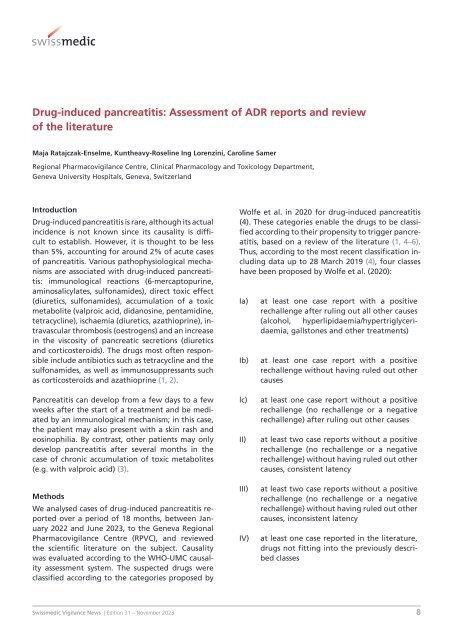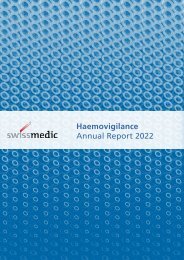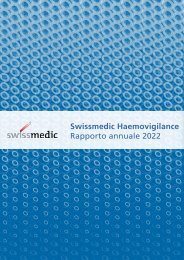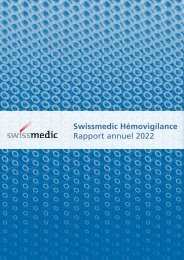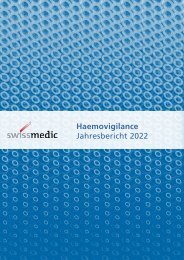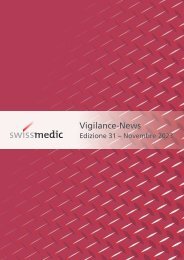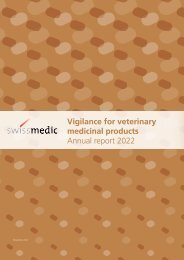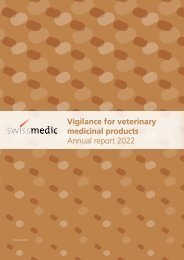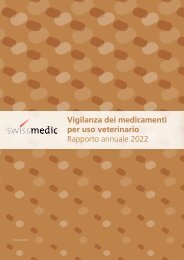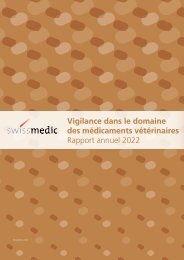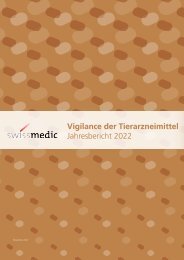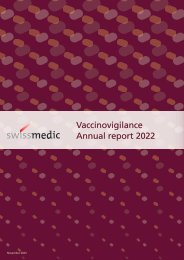Swissmedic Vigilance News
Edition 31 – November 2023
Edition 31 – November 2023
You also want an ePaper? Increase the reach of your titles
YUMPU automatically turns print PDFs into web optimized ePapers that Google loves.
Drug-induced pancreatitis: Assessment of ADR reports and review<br />
of the literature<br />
Maja Ratajczak-Enselme, Kuntheavy-Roseline Ing Lorenzini, Caroline Samer<br />
Regional Pharmacovigilance Centre, Clinical Pharmacology and Toxicology Department,<br />
Geneva University Hospitals, Geneva, Switzerland<br />
Introduction<br />
Drug-induced pancreatitis is rare, although its actual<br />
incidence is not known since its causality is difficult<br />
to establish. However, it is thought to be less<br />
than 5%, accounting for around 2% of acute cases<br />
of pancreatitis. Various pathophysiological mechanisms<br />
are associated with drug-induced pancreatitis:<br />
immunological reactions (6-mercaptopurine,<br />
aminosalicylates, sulfonamides), direct toxic effect<br />
(diuretics, sulfonamides), accumulation of a toxic<br />
metabolite (valproic acid, didanosine, pentamidine,<br />
tetracycline), ischaemia (diuretics, azathioprine), intravascular<br />
thrombosis (oestrogens) and an increase<br />
in the viscosity of pancreatic secretions (diuretics<br />
and corticosteroids). The drugs most often responsible<br />
include antibiotics such as tetracycline and the<br />
sulfonamides, as well as immunosuppressants such<br />
as corticosteroids and azathioprine (1, 2).<br />
Wolfe et al. in 2020 for drug-induced pancreatitis<br />
(4). These categories enable the drugs to be classified<br />
according to their propensity to trigger pancreatitis,<br />
based on a review of the literature (1, 4–6).<br />
Thus, according to the most recent classification including<br />
data up to 28 March 2019 (4), four classes<br />
have been proposed by Wolfe et al. (2020):<br />
Ia)<br />
Ib)<br />
at least one case report with a positive<br />
rechallenge after ruling out all other causes<br />
(alcohol, hyperlipidaemia/hypertriglyceridaemia,<br />
gallstones and other treatments)<br />
at least one case report with a positive<br />
rechallenge without having ruled out other<br />
causes<br />
Pancreatitis can develop from a few days to a few<br />
weeks after the start of a treatment and be mediated<br />
by an immunological mechanism; in this case,<br />
the patient may also present with a skin rash and<br />
eosinophilia. By contrast, other patients may only<br />
develop pancreatitis after several months in the<br />
case of chronic accumulation of toxic metabolites<br />
(e.g. with valproic acid) (3).<br />
Methods<br />
We analysed cases of drug-induced pancreatitis reported<br />
over a period of 18 months, between January<br />
2022 and June 2023, to the Geneva Regional<br />
Pharmacovigilance Centre (RPVC), and reviewed<br />
the scientific literature on the subject. Causality<br />
was evaluated according to the WHO-UMC causality<br />
assessment system. The suspected drugs were<br />
classified according to the categories proposed by<br />
lc)<br />
II)<br />
III)<br />
IV)<br />
at least one case report without a positive<br />
rechallenge (no rechallenge or a negative<br />
rechallenge) after ruling out other causes<br />
at least two case reports without a positive<br />
rechallenge (no rechallenge or a negative<br />
rechallenge) without having ruled out other<br />
causes, consistent latency<br />
at least two case reports without a positive<br />
rechallenge (no rechallenge or a negative<br />
rechallenge) without having ruled out other<br />
causes, inconsistent latency<br />
at least one case reported in the literature,<br />
drugs not fitting into the previously described<br />
classes<br />
<strong>Swissmedic</strong> <strong>Vigilance</strong> <strong>News</strong> | Edition 31 – November 2023<br />
8


